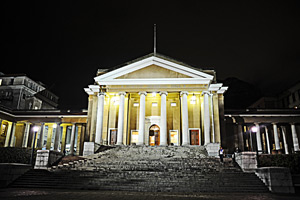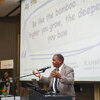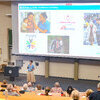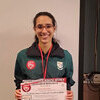UCT delighted with Times Higher Education ranking
04 October 2012 | Story by Newsroom UCT has been placed at 113 in the Times Higher Education (THE) World University Rankings for 2012 released on 3 October. The university was ranked at 103 in 2011 and 107 in 2010. In addition to being once again ranked among the top 200 universities in the world, UCT has also, more significantly, been listed for the first time among the Top 50 clinical, pre-clinical and health universities around the world.
UCT has been placed at 113 in the Times Higher Education (THE) World University Rankings for 2012 released on 3 October. The university was ranked at 103 in 2011 and 107 in 2010. In addition to being once again ranked among the top 200 universities in the world, UCT has also, more significantly, been listed for the first time among the Top 50 clinical, pre-clinical and health universities around the world.
Acting vice-chancellor Professor Danie Visser said: "Our ranking remains a measure of consistently high international standing and reputation. Our positions over the last three years indicate a consistently strong performance relative to the thousands of other universities around the world who are ranked by the THE system." In fact, UCT's scores rose over the year in all but one of the system's measurement categories:
| Category | 2011 | 2012 |
| Overall score: | 53.2 | 55.8 |
| Teaching: | 34.3 | 34.7 |
| International Outlook: | 73.9 | 75.1 |
| Industry Income: | 97.5 | 87.3 |
| Research: | 41.1 | 45.5 |
| Citations: | 75.3 | 79.7 |
The THE system uses 13 individual performance indicators, which are intended to cover all three core missions of a university in its methodology: research, teaching and knowledge transfer. The highest weighted category remains "research influence", measured by the number of times a university's published work is cited in the papers of other academics. Knowledge transfer activities are also included in an "industry income - innovation" category (worth 2.5% of the total ranking score) based on research income from industry.
"There are thousands of universities in the world and the rankings are a relative positioning," said Visser. "It is possible for a university to score better on all the criteria but still end up lower on the rank scale, just because some other institutions tried even harder."
Results from the Quacquarelli Symonds (QS) World University Rankings for 2012/13, released on 11 September place UCT at 154, from 156 in 2011 and 161 in 2010 - the only university in Africa in the top 200. The rankings also place four other South African universities in the top 700.
The QS system uses: academic peer review: 40%; employer/recruiter review: 10%; student-faculty Ratio: 20%; citations per faculty member: 20%; proportion of international faculty members: 5%; proportion of international students: 5%.
"It is gratifying to be so well regarded by our peers, but we remain conscious that different institutions have their own strengths and bring their own particular value to their students. As a research-led university, UCT does well in global rankings because they all place a particular emphasis on research," said Visser.
UCT also performed well in the Shanghai Jiao Tong Academic Ranking of World Universities (ARWU), released in August. The ARWU ranking for UCT remains unchanged in the 200-300 range, ranking UCT, once again, as the top university in Africa. The University of the Witwatersrand (Top 400) and the University of KwaZulu-Natal (Top 500) are the other South African universities that made the list.
The indicators used by the ARWU ranking include the number of alumni and staff winning Nobel Prizes and Fields Medals, the number of highly cited researchers selected by Thomson Scientific, number of articles published in journals of Nature and Science, number of articles indexed in Science Citation Index - Expanded and Social Sciences Citation Index, and per capita performance with respect to the size of an institution.
"The high international rankings held by UCT and other South African universities help to send out the message that students can receive a world-class education in South Africa. However, the rankings do not measure many crucial aspects of a particular university's mission, especially in the developing world," said Visser.
"For example, UCT devotes hundreds of millions of rands to promoting access to financially needy students who would not otherwise be able to come to a world-class university; to development programmes that recognise the inadequate academic preparation of many students admitted to UCT; to outreach projects that engage with communities that are in need of our support where we can be of use; and to research that addresses the key challenges of our society, such as infectious diseases, poverty and inequality, violence, climate change, and countless other issues. None of this is recognised in the rankings systems.
"Thus while we are enormously proud of our achievements on the international playing fields, concern for rankings should never deflect us or any university from pursuing its duty to be socially responsive to the needs the community in which it lives."
Full results of the Times Higher Education World University Rankings are available on the THE website.
Start local, go global and fight the nation's corner - article written by UCT vice-chancellor Dr Max Price.
 This work is licensed under a Creative Commons Attribution-NoDerivatives 4.0 International License.
This work is licensed under a Creative Commons Attribution-NoDerivatives 4.0 International License.
Please view the republishing articles page for more information.










